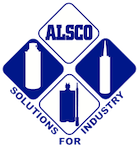Industrial adhesives are used to bond two different components or surfaces together. Premium-quality industrial adhesives are used for completing many types of projects.
So what is the difference between industrial adhesives and consumer adhesives? As its name suggests, industrial adhesives are predominantly designed for industrial applications, where they require higher cured properties than consumer grades and are better suited to more arduous applications and operating environments.
Industrial adhesives are used in a broad assortment of manufacturing and assembly processes across a large number of industrial sectors. They provide the strongest possible bonded structures in a variety of demanding applications. Additionally, they are more resistant to chemicals, high temperatures, shock loads, vibration, pressure and atmospheric conditions. These properties allow them to provide long-term and/or permanent performance covering a multitude of manufacturing uses encompassing a wide variety of industries.
Showing 1–12 of 43 results
-
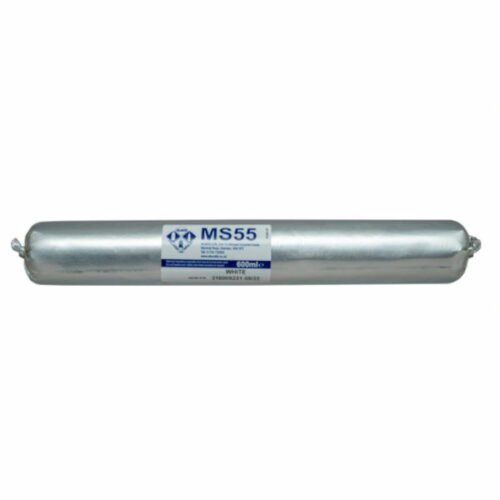
Alsco MS55 600ml White
£7.94 Excl VATAdd to basketSold only in Full Box Quantities.
Single component MS polymer
High Strength structural adhesives
Suitable for use on a wide range of substrates
High grab properties
Silane terminatedMS55 MS Polymer/Hybrid Adhesive is an adhesive designed to provide superior performance and lasting durability to create a strong flexible bond between two surfaces. This product offers high strength once cured with very high initial grab characteristics to effectively hold surfaces together whilst the product cures to its rubberised full strength state. It has excellent unprimed adhesion characteristics and is suitable for many materials including wood, metal, plastic, composites, and most other porous materials. The MS55 adhesive is resistant to moisture and temperature changes, allowing it to be used indoors as well as outdoors, if you’re looking for a multi-purpose adhesive for Industrial and construction use, Alsco’s MS55 should be at the top of your list.
-

Araldite 2011 – 50ml Neutral
£17.85 Excl VATAdd to basketSold only in Full Box Quantities.
Two component Epoxy
Bonds multiple metal and plastics
Long pot life – 100mins at RT
Self levelling
Resistant to dynamic loadsAs a multi-purpose adhesive, Araldite 2011 is trusted by engineers, technicians and DIY enthusiasts alike for its reliable performance in a range of industries. It’s used as an automotive adhesive and for industries like construction, marine and general Industrial applications.
With its two-component epoxy resin formulation, Araldite 2011 provides an exceptionally strong bond that can withstand even the most challenging environments. Whether you need to bond metals, plastics, ceramics or rubber, Araldite 2011 is up to the task.
-
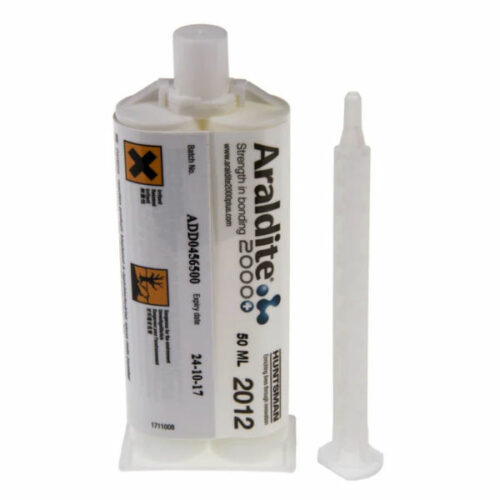
Araldite 2012 – 50ml Neutral
£19.52 Excl VATAdd to basketAraldite 2012 is a high-strength adhesive that has become a popular choice among DIY enthusiasts and professionals alike. With its superior bonding capabilities, Araldite 2012 has proven to be a reliable solution for a variety of applications, from Industrial manufacturing to DIY and construction projects.
Whether you’re a design engineer, fabrication specialist, experienced tradesperson DIY enthusiast or simply looking for an effective adhesive for your next project, Araldite 2012 is an ideal choice.
Sold only in Full Box Quantities.
Two component Epoxy
6 minutes pot life at RT
20 minutes fixture time at RT
Self levelling
Resistant to dynamic loads -

Araldite 2014-2 50ml Grey
£17.85 Excl VATAdd to basketSold only in Full Box Quantities.
Two component epoxy
110 minutes pot life at RT
5 hours fixture time at RT
Resistant to chemicals
Temperature resistantAraldite 2014-2 is a high temperature epoxy resin that is used in the production of metal and composite materials. It is a two-part system that consists of a resin and a hardener. The two parts are mixed and then applied to the surface to be bonded. Once it cures, it forms a strong bond that can withstand high temperatures and pressures.
Araldite products are available in over 80 countries and are used in various industries, including automotive, aerospace and construction. The brand is created by Huntsman Advanced Materials, known for its Araldite glue and Araldite epoxy products.
-
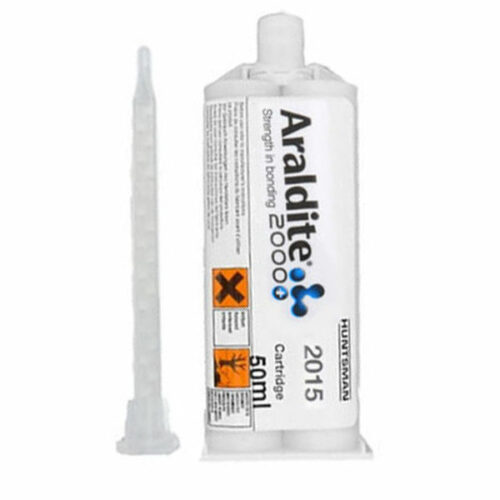
Araldite 2015-1 50ml Beige
£19.73 Excl VATAdd to basketSold only in Full Box Quantities.
Two component epoxy
45 minutes pot life at RT
4 hours fixture time at RT
High gap filling property
High fracture toughnessAraldite 2015-1 is a versatile, two-part epoxy adhesive that offers exceptional bonding performance for a wide range of materials. With its unique formula, Araldite 2015-1 provides a strong, permanent bond that can withstand extreme temperatures and moisture. This epoxy resin is perfect for bonding GRP composites, metals, plastics, ceramics, wood, and much more. Whether you’re repairing, building, or simply fixing, Araldite 2015-1 provides a dependable solution for all your bonding needs.
-

Araldite 2021-1 50ml Amber
£11.49 Excl VATRead moreSold only in Full Box Quantities.
Two component methacrylate adhesive
Fast curing
Toughened
Multi purpose
Suitable for services at temperatures up to 100 degrees -
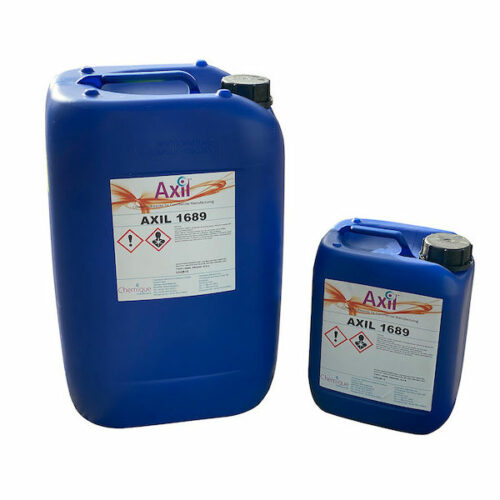
Chemique Axil 1689 25ltr Neutral
£181.98 Excl VATAdd to basketSold only in Full Box Quantities.
Industrial contact adhesive
Sprayable
Bonds insulation materials and synthetic foam
It is unsuitable for bonding plasticised PVC which will require a polyurethane adhesive grade -

Everbuild Hybriflex 40 290ml Grey
£4.19 Excl VATAdd to basketSold only in Full Box Quantities.
Excellent chemical resistance
Bonds to concrete, wood, metal, aluminium, polyester, glass, UPVC stone etc
Over paintable with gloss and emulsion paints-pre-liminary test required before use.
Excellent resistant to solvents when cured -

Everbuild Lumberjack 5 minute 310ml Cream
£7.56 Excl VATRead moreSold only in Full Box Quantities.
Fast setting – 5 minutes
Exceptional bond strength to wood and most common building surfaces
Fully water proof
Internal and external use
Excellent chemical resistanceBuilding projects can often be time-consuming, but not with the right materials and tools. Everbuild’s Lumberjack 5-minute wood adhesive allows you to complete jobs quickly and easily. This powerful adhesive sets hard in just five minutes, making it ideal for Industrial, joinery, DIY and assembly functions.
Sika AG owns Everbuild Building Products Ltd. This brand is well-known for its Everbuild Stixall line, Stixall adhesive & sealant products, tapes, expanding foams, plumbing and heating supplies and other building supplies.
-
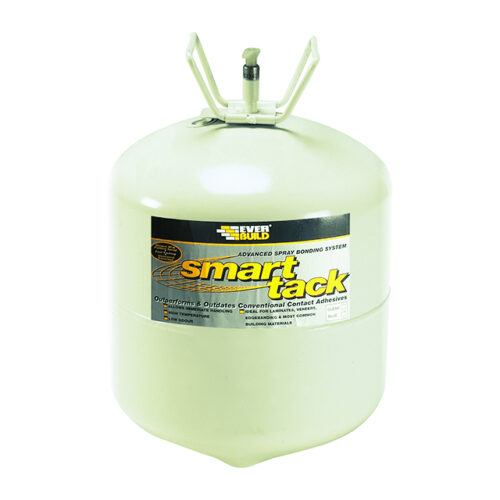
Everbuild Smart Tack 17kg
£189.58 Excl VATRead moreSold only in Full Box Quantities.
Fast tacking, can normally be closed after only 3-5 minutes
Long open time – surfaces can be left open up to 2 hours
Immediate handling time, surfaces can be cut, drilled, planned with in 5 minutes of closure
Cost effective, goes approximately 3 times further than conventional contact adhesive
Safer – low odour, no CFC’s, self contained system. -

Fix All Seal & Bonds
£4.62 Excl VATSelect optionsSold only in Full Box Quantities.
High Tack Polymer Adhesive and Sealant
High Initial Grab – 320KG/10cm2
Over Paintable
High UV Stability
Weather and Waterproof -

Geobond HG 290ml White
£5.37 Excl VATRead moreSold only in Full Box Quantities.
High grab strength and fast initial grip
Ultimate high strength once cured
High UV and aggressive atmosphere resistance
No shrinkage
Excellent primer less adhesion to a wide range of substrates
FAQs
What Is an Industrial Strength Adhesive Used for?Adhesives play a highly significant role in industrial manufacturing processes. Industrial adhesives are commonly used for bonding and assembling components in various sectors, including Automotive, Marine, Transportation, Renewables, construction (including modular builds) electronics, wood and many other industries. These industries leverage industrial strength adhesives in manufacturing products that we use in our day-to-day lives.
Automotive: Industrial adhesives are extensively from the chassis to interior and external sub components and glazing to improve aesthetics and increase torsional stiffness.
Transportation: Building up from an OEM chassis, commercial vehicles structures are extensively bonded and sealed internally and externally to create a multitude of finished designs for freight vehicles, caravans, motorhomes, emergency service vehicles and military uses.
Renewables: Many new technologies linked to power generation are originally constructed using adhesives and sealant technologies and also maintained “in the field” using these to repair, overhaul and maintain their efficiency and longevity.
Construction: Commonly used cement based mortars and grout are being increasingly supplemented with the use of new chemical polymer based adhesives and sealants in a multitude of construction applications in domestic, commercial and office structures to meet the ever increasing demands for thermal improvements and energy efficiency.
Marine: Industrial adhesives play a significant role in the assembly of boats and ships in hull construction, glazing, decking and sub components.
Other markets covered by adhesives and sealants include Electrical, HVAC, Woodworking, Furniture, Containers, Recreational products, sports equipment and many others.
There are natural adhesives and synthetic adhesives. Natural adhesives as they suggest are derived from naturally occurring raw materials such as rubbers, cements, silicone, plant and other organic derivatives. In the case of synthetic adhesives, these are generally derived from oil based stocks and the refining creates a range of raw materials that are formulated into different polymers types, these polymers can then be used to build a wide array of chemical based adhesives and sealants which form strong permanent adhesion to surfaces resistant to heat, vibration, chemicals and many other atmospheric conditions.
The range of adhesives for industrial applications is very broad, which explains why these adhesives are available in such a wide variety of forms. They can be classified in several ways, such as according to their cure mechanism, adhesion properties and chemical composition. Here are some common types of industrial adhesives:
Acrylic: It offers excellent performance in adverse weather conditions. There is a relatively long setting time for this type of adhesive. However, you can accelerate the process by using heat or activators.
Epoxy: This type of adhesive is commonly used in aerospace, Industrial and automotive industries. It is capable of curing quickly and bonding metal, plastics, composites and construction surfaces well. Moreover, it is capable of handling high mechanical stresses, but can be brittle and subsequently poor at dealing with dynamic forces and coefficient of expansion between different material types.
Polyurethane: It is highly flexible and impact-resistant, and it also offers outstanding durability, although is susceptible to UV degradation. Polyurethane adhesives are used in automotive, marine, construction and woodworking projects, may need primers for use on some surfaces.
Silicone: Industrial silicone adhesive is notable for its high degree of flexibility, good sealing properties and high resistance to high temperatures, solvents and UV. It’s commonly used in the construction, glazing, marine and plumbing industries. High atmospheric moisture content (50% relative humidity) is necessary before single-component silicone adhesives undergo polymerisation. In a case where the temperature or humidity are very low, this can either significantly slow down or prevent cure and it may be more appropriate to use a two-component variant. Silicone products are not overpaintable and are often excluded for use (either close to or in the entire factory) where pain is applied to finished assemblies or vehicles.
MS Polymer /Hybrid these are new generation flexible adhesive and sealants combining the good adhesion of polyurethanes and the atmospheric resistance of silicones, but can be overpainted. These products also offer users the benefits of primerless adhesion in most cases when compared with Polyurethane products, so are almost universal in their uses and applications.
Hot melt: As eluded by the name, these are applied hot and require an applicator gun to heat from a solid form to a more liquified state for application, they offer instant adhesion once cooled. Supplied in thin “pencil”, or stubby “slug” form as well as bulk, they offer good adhesion to most surfaces but for more arduous applications may need to be supplemented in conjunction with more structural adhesives.
Contact: A solid adhesive thinned with solvents, obtaining strength and adhesion through the evaporation of the solvent leaving the residual rubber-like material on the surface. This kind of adhesive is rapid curing and can be used to bond different materials temporarily or permanently. It is suitable for use on porous and uneven surfaces and provides some flexibility once cured.
Anaerobic: This type of adhesive does not require the use of oxygen to set, so generally ideal for applications with very tight tolerances such as bolts into threads, they generally work best metal to metal, with some slower than others, dependant on the level of reactivity between the two metal surfaces.
Cynoacrylate commonly known as “superglue” are adhesives using atmospheric or surface moisture to cure instantly. Predominantly clear, some are toughened with the addition of rubbers making them black but to give a more flexible impact resistant bond. Generally they are not suitable for applications where subjected to or immersed in water as this leads to ultimate bond failure over time.
Conductive: Common industries that use conductive adhesives are construction and those that want to prevent electrostatic discharge (ESD). Certain sealants can also have conductive dielectric properties for use in electrical and power generation applications to prevent power spikes and power outages.
Pressure-sensitive: This type of adhesive can be activated without the need for solvents, water or heat. It is designed to create a strong bond and maintain it at room temperatures. They are activated by two surfaces coming together where a certain pressure needs to be applied to force adhesion to the surfaces being bonded, most industrial tapes work in this method too.
UV curing: This adhesive relies on UV light to initiate the curing process, so generally work best on clear surfaces to allow the light to penetrate through to cure. Can be used for Industrial and automotive lighting along with decorative glass and plastic bonding.
This is the key question and why expert advice is critical from the outset to ensure all aspects are considered to eliminate future problems. When selecting which adhesive to use on a project, you will initially need to consider the surfaces being bonded/sealed and how these will ideally be assembled including production time constraints and operator use.
The ideal solution will need to incorporate the environmental conditions the bonded assembly will operate in such as operating temperature range, humidity, exposure to the UV radiation, chemicals, mechanical and dynamic stress factors and overpaintability considerations.
There are different ways to remove industrial adhesives. First, you can try using an industrial-grade adhesive remover. However, it should be noted that it might damage certain surfaces. Another method you can use is applying heat to remove the adhesive. When heated, some adhesives melt or soften, enabling easier removal. And when the surface is hot enough, you can try to gently scrape away the glue with a small scraper. In many cases as Industrial Adhesives are designed to provide permanent adhesion, some bonded assemblies may not be able to be separated without totally destroying the assembled parts, or only mechanical abrasion will remove residues.
